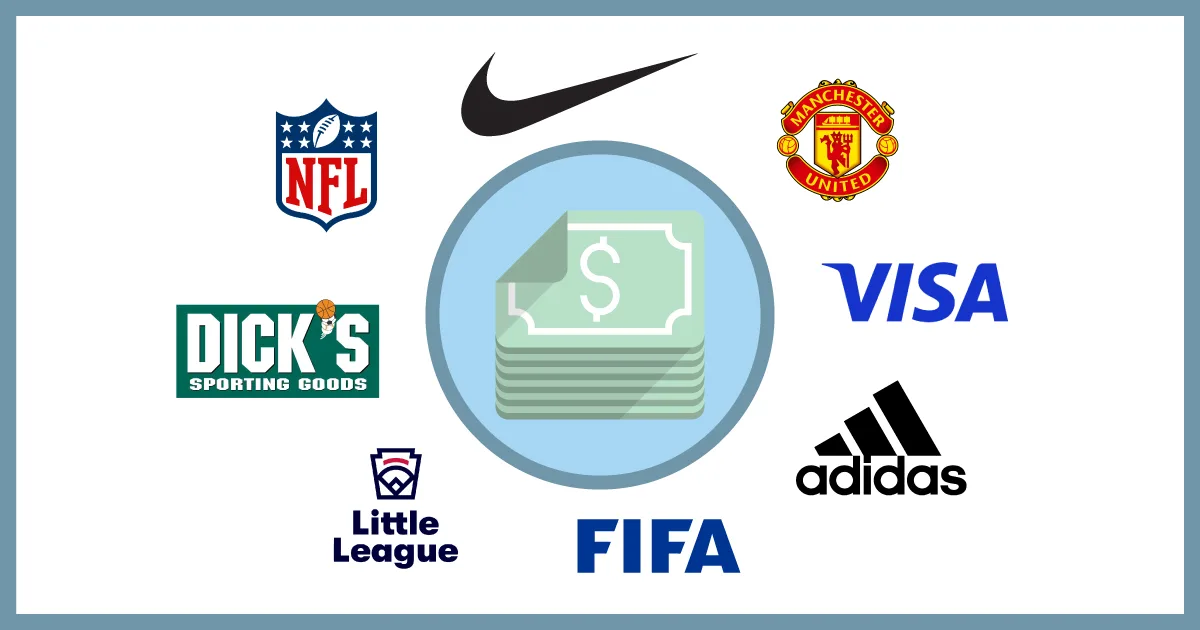In today’s dynamic world, sports have undergone a remarkable metamorphosis, transcending their traditional recreational essence to become a dominant force in the global economy. This blog delves into the captivating journey of sports as a multi-billion dollar industry, where the fusion of sports and economics has revolutionized the professional sporting landscape. Here, we unveil the awe-inspiring economic impact that sports exert on athletes, franchises, and fans alike. From skyrocketing player salaries and lucrative sponsorship deals to the development of state-of-the-art stadiums and the cultural influence on societies worldwide, the colossal economic powerhouse of sports has left an indelible mark on the modern era. Join us on this captivating exploration of the intricate relationship between sports and economics, unraveling the awe-inspiring spectacle that continues to captivate hearts and minds across the globe.
The Business of Sports Franchises
Sports franchises have become valuable commodities that attract massive investments. The business of owning a sports team is no longer driven solely by passion but by the potential for lucrative returns. In recent years, the world of sports has witnessed a significant surge in major investments and franchise acquisitions, with valuations reaching unprecedented heights across various leagues.
The Brooklyn Nets, a franchise in the NBA, provides a compelling case study in the realm of sports investments. In 2019, the team was purchased by Joseph Tsai, the co-founder of Alibaba, a Chinese multinational conglomerate. The acquisition cost Tsai a staggering $2.35 billion, and this substantial investment was driven not only by his passion for basketball but also by the immense potential for financial returns. With star players like Kevin Durant and Kyrie Irving leading the team, the Nets’ popularity soared, attracting fans from around the world and elevating the franchise’s overall value. Brooklyn Nets is presently valued at around $3.5 billion.
Football, being the most popular sport globally, has also witnessed its fair share of remarkable investments and franchise valuations. In the realm of European football, Paris Saint-Germain (PSG) stands out as a prime example. The club, valued at $100 million then, experienced a meteoric rise in value after being acquired by Qatar Sports Investments (QSI) in 2011. With an injection of substantial funds from QSI, PSG was able to attract top-tier players like Neymar Jr., Kylian Mbappé, and Lionel Messi catapulting the team to international stardom. The strategic investments paid off, and the club is currently valued at over $4 billion, highlighting the growing trend of football clubs becoming highly valuable assets.
While traditional sports like football, basketball, and baseball have seen remarkable investments, newer and alternative sports have also captured the attention of investors. Take, for instance, esports – a form of competitive gaming that has exploded in popularity in recent years. Esports franchises, especially those participating in popular games like League of Legends and Overwatch, have garnered significant investments from traditional sports team owners and tech entrepreneurs. These acquisitions are driven by the increasing viewership and revenue potential from media rights, sponsorships, and merchandising in the burgeoning esports industry.
The business of owning sports franchises has evolved into a highly lucrative endeavor, with investors eyeing potential returns beyond their passion for the game. From the English Premier League to the NBA, and even in the realm of esports, major investments and franchise valuations are reaching historic highs. As the sports industry continues to grow and expand its global reach, the allure of owning a successful sports team will likely persist, making it a dynamic and ever-evolving market for investors seeking both financial gains and the thrill of sports ownership.

Media Rights and Broadcasting
The symbiotic relationship between sports and media has indeed been a driving force behind the exponential financial growth of the sports industry. In recent years, broadcasting rights have become a highly lucrative revenue stream for both sports leagues and individual athletes. As the demand for sports content continues to surge, television networks and online streaming platforms are willing to bid exorbitant sums to secure exclusive rights to broadcast major sporting events, making it a win-win situation for all stakeholders involved.
One notable real-time media rights acquisition is the National Basketball Association (NBA). In 2014, the NBA signed a nine-year deal with ESPN and TNT, worth approximately $24 billion. This marked a significant surge from the previous broadcasting agreement and highlighted the immense popularity and global appeal of NBA basketball.
Another remarkable example is the English Premier League (EPL). Football (soccer) is one of the most-watched sports globally, and the EPL is undoubtedly one of the most prestigious and competitive football leagues in the world. Television networks like Sky Sports and BT Sport have consistently engaged in fierce bidding wars to secure broadcasting rights for EPL matches. The international broadcasting rights for the Premier League has increased from €4.2 billion for the 2019-2022 cycle to €5.5 billion for the 2022-2025 cycle, surpassing the value of the domestic contracts, emphasizing the immense financial worth of top-tier football content.
Moreover, major international sporting events continue to captivate global audiences and attract massive media rights deals. The Olympic Games, which occur every four years, is one such event. The International Olympic Committee (IOC) has managed to generate substantial revenue through media rights agreements. For instance, in 2016, NBCUniversal secured the exclusive rights to broadcast the Olympic Games in the United States until 2032 for a staggering $7.75 billion.
Furthermore, streaming platforms have entered the sports broadcasting arena, further driving up media rights valuations. Companies like Amazon Prime, DAZN, and others have started to compete with traditional broadcasters for exclusive sports content. For example, DAZN & Amazon have secured rights to stream the UEFA Champions League in various countries, disrupting the traditional broadcasting landscape.
With broadcasting rights becoming a major source of revenue for leagues and athletes, the competition among television networks and online platforms for exclusive content continues to fuel unprecedented valuations. As sports continue to captivate audiences worldwide, it is expected that media rights acquisitions will remain a pivotal component in the industry’s financial success and expansion.

Sponsorships and Endorsements
Athletes with remarkable skills and mass appeal are highly sought after by brands for endorsements. Successful endorsements not only elevate the athlete’s brand but also offer a steady stream of income. Companies are willing to pay astronomical amounts to have their products associated with sports stars, knowing that fans often idolize and emulate their favorite athletes.
There are numerous sponsorship deals that have significantly contributed to the sporting economy. One notable example is soccer superstar Cristiano Ronaldo’s partnership with Nike. Ronaldo’s immense global popularity and extraordinary on-field skills have made him a sought-after figure for various brands. His long-standing association with Nike has led to the creation of the “CR7” line of sportswear and footwear, which has become immensely popular worldwide.
Another prominent endorsement deal involves tennis legend Serena Williams, who has a longstanding partnership with Nike as well. Serena’s unparalleled success in the tennis world, coupled with her strong commitment to promoting gender equality and supporting social causes, has significantly boosted her popularity among a wide range of audiences. As a result, she has been able to collaborate with numerous diverse brands.
Such sponsorship deals not only elevate the athletes’ personal brands but also fuel the sporting economy by driving sales and cultivating a devoted fan base. The influence and mass appeal of these sports stars makes them invaluable assets for brands, allowing them to reach a broader audience and remain at the forefront of the competitive market.

Sports Tourism
Sports tourism plays a pivotal role in shaping the sports economy, contributing significantly to the revenue and growth of the sports industry. It involves travelers visiting different destinations to participate in or witness sporting events. Such events attract millions of spectators and participants from around the globe, stimulating local economies, generating job opportunities, and promoting infrastructural development.
An excellent example of sports tourism’s impact is the Qatar 2022 World Cup. The event drew an influx of tourists to Qatar, leading to significant economic benefits. For instance, during the tournament, Qatar witnessed a substantial rise in hotel bookings, with over 1.3 million visitors recorded. This surge in tourism generated a significant boost in the hospitality sector, benefiting hotels, restaurants, and other service industries.
Moreover, sports tourism has long-lasting effects, as hosting major events improves a country’s international image, promoting future tourism. Qatar invested heavily in modern stadiums and infrastructure, transforming the nation into a sporting destination. This, in turn, can continue to attract sports enthusiasts long after the event, providing a lasting legacy for the sports economy.

Sports Betting and Fantasy Sports
The rise of online sports betting and fantasy sports platforms has indeed revolutionized the sports industry and contributed significantly to its economic growth. With the gambling market on sports events estimated to be in the hundreds of billions of dollars globally, the financial impact is substantial. As more countries legalize sports betting, the industry’s economic potential continues to expand.
Fantasy sports platforms like DraftKings and Betway have experienced explosive growth, attracting millions of users who are willing to pay for subscriptions and creating valuable advertising partnerships. The integration of these platforms with live sports events offers fans an immersive and engaging experience, increasing their interest and investment in sports. This heightened engagement leads to higher viewership, ticket sales, merchandise purchases, and increased revenue for sports leagues, teams, and broadcasters. Moreover, the flourishing sports betting and fantasy sports markets have also given rise to job opportunities in technology, marketing, and data analysis, further contributing to the overall sports economy’s prosperity.

Conclusion
Sports and economics are intertwined in a fascinating dance that has transformed sports into a multi-billion-dollar industry. From owning sports franchises to broadcasting rights, sponsorships, and sports tourism, the economic impact is felt across various sectors. While the financial gains have been substantial, it’s essential to strike a balance between commercialization and the essence of sports as a form of entertainment, competition, and the human spirit. As the sports industry continues to grow, the challenge lies in maintaining the integrity of the games while reaping the benefits of its economic potential.

